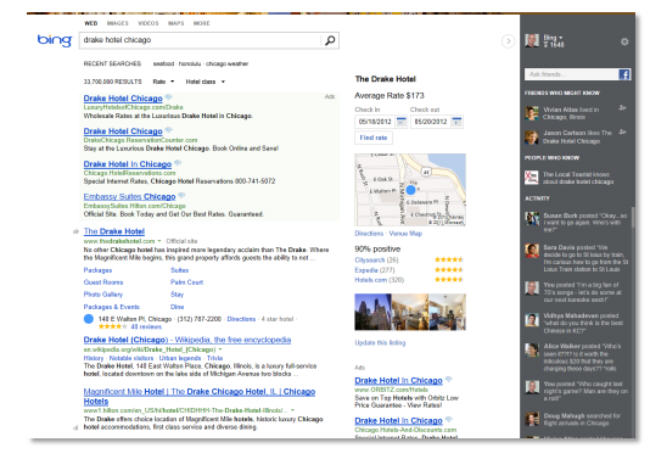Microsoft has made some significant changes to its Bing search engine that sees it finally add a social dimension through a long overdue (and deeper) integration with Facebook. This could be the start of a process that will see perhaps Hotmail and Messenger integrate more closely with Facebook.
Just this week, I pointed out that many of Microsoft’s top products were missing the social glue that is becoming apparent in rival Google’s products. Over the last couple of months Google has been steadily adding Google+ to its main search service to the chagrin of players like Twitter. In recent weeks this change has been apparent in Gmail and Google News.
Microsoft never got over being the world’s biggest software company and does things at its own pace, often with quirky or odd results. It often does things in a misguided way with the bubble mindset of groupthink; oh how we blush at how CEO Steve Ballmer dismissed the iPhone – “it doesn’t have buttons,” he gassed – only four years ago. Now the touchscreen Windows Phone and the forthcoming Windows 8 with tablet sensibilities are at the heart of the company’s strategy. See what I mean?
When Bing was introduced first Microsoft called it a “decision engine” but I can’t recall Bing ever helping me make any decision of any description. Finally I think that’s about to change.
A more socially adept Microsoft; who’d have thought?
The changes outlined in Bing show a greater social awareness and suggest to me at least Microsoft realises no man, or software company, is an island. At least not in 2012.
The new Bing will principally have three columns. The first column is the Bing search engine we are all familiar with. According to the ‘Bing team’, the core search engine has been overhauled in terms of algorithms to give a more comprehensive and accurate set of results.
Microsoft is quite confident in the quality of its search results. A test in January 2011, where the software company removed branding from Bing and Google, showed that 34pc of people preferred Bing while 38pc preferred Google. A more recent test with the new search tools showed that 43pc preferred Bing while 28pc preferred Google.
The middle column is what Microsoft has endearingly chosen to call ‘Snapshot’. It pulls together services related to a user’s search, including maps, restaurant reservations and reviews. This is actually quite clever on Microsoft’s part as it opens the door to many commercial possibilities and no doubt Google will be watching this intently.
The middle column with more dynamic multimedia results was developed in collaboration with OpenTable and FanSnap.
Finally the third column, and this is the most profound change in my opinion, is the ‘sidebar’ on the far right where your Facebook friends’ recommendations can play a part in your search.
It includes an ‘Ask Friends’ function that allows users to post a question and get help from Facebook friends in the midst of a query. Users can also tag friends that Bing suggests might know more about the topic you are searching.
These results are based on what your friends ‘like’, as well as their Facebook profile information or photos they have shared.
But Facebook isn’t the only social network to benefit from this upheaval of Bing. Users can also see related posts to a search they are conducting from top experts and enthusiasts in Foursquare, Quora, LinkedIn, Google+ and Blogger and allows the searcher to ask them a question.
The overhauled search engine will begin deploying in the US in the coming days.
In the next few weeks, a new version of Bing for mobile (m.bing.com) will also begin rolling out that will be optimised for touchscreen phones – they’re the ones without buttons, Steve.
All in all I think the new Bing is the work of a more socially aware, socially adept Microsoft and I think the integration of real-time search with other social networks is an astute move and truly changes the dynamic of search as we know it.
Interesting times.
